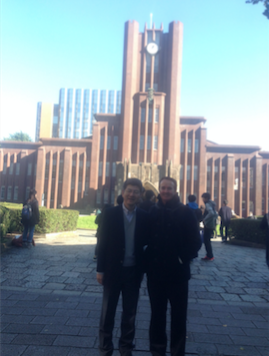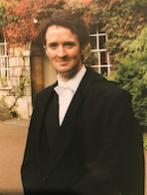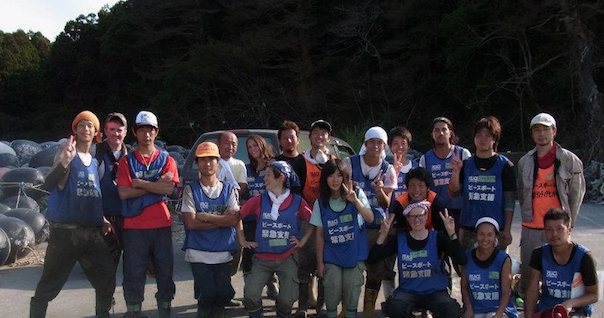Featured professor: Dr. Senan Fox
Dr. Senan Fox is an Associate Professor at the School of International Studies at Kanazawa University. His research interests focus on themes related to conflict, territorial disputes, and ideology. His publications include a recently published book “China, South Korea, and the Socotra Rock” dispute (published by Palgrave Macmillan) and a journal article “The Senkaku Shoto/Diaoyu Islands and Okinotorishima disputes: Ideational and material influences” (published by Sage). He has been awarded funding from the Japanese government for research on regional disputes at the University of Tokyo, and more recently from the Konosuke Matsushita (Panasonic) Memorial Foundation for research into Sino-Japanese relations and rare earth elements. He has also published media articles relating to international relations and modern history in the Asia Times, Japan Today, Open Democracy, the Sydney Morning Herald and other publications. In addition, he has presented his work at conferences in countries throughout the world including Japan, the USA, the UK, China, Germany and others. Dr. Fox has also volunteered with humanitarian NGOs in Japan (2011 and 2015), Palestine (2014), and the Philippines (2013).

Degrees:
PhD in International Relations (University of Saint Andrews, UK)
M.St. in Modern History (University of Oxford, UK)
BA in History and Politics (First) (Kingston University, UK)
Q1: What do you specialize?
I currently specialize in international relations with a particular interest in topics related to the themes of conflict, ideology, and territorial disputes. This is reflected in undergraduate courses that I teach at Kanazawa University such as “Major Global Issues and Challenges” and “A History of International Politics (East Asia focus)” where topics such as globalization, human rights, imperialism, the causes and consequences of war, and the South China Sea disputes etc. are explored. In addition to global and historical themes, we also study the impact of a select number of countries and regions on international relations. My publications and research in recent years relate to regional relations in East Asia, maritime disputes in East Asia, and related issues. At the post-graduate level, I provide courses related to China-Japan relations since 1972 and Korea since 1945. My recently published book (by Palgrave Macmillan) exclusively addresses the political, historical and important contemporary strategic implications of the decades-long Socotra Rock dispute between China and South Korea. The submerged rock, located between mainland China and the Korean Peninsula, straddles the Yellow Sea and the East China Sea. As China continues asserting its sovereignty and jurisdiction in maritime areas, the book will provide food for thought for scholars, think-tank researchers, and policymakers. For more details, please visit my website:
Q2: You have studied and taught outside Japan. How does your overseas experience help your research?
I was born and raised in Ireland, a European Union (EU) member state. I completed my university education in the UK, spending time in London, Oxford, and Scotland. For one year, I enjoyed a memorable study abroad program as an international exchange program student at a university in North Carolina, the USA. Thanks to this program, I was introduced to Japanese friends and to Japan in general, thus commencing a life-long interest and connection to East Asia. In addition to my studies in foreign countries, I have taught courses related to International Relations and Modern History at a university in London (2006 to 2010). My travel experiences include long-term living experiences in six countries (Australia, China, Ireland, Japan, the UK, and the USA) and visits (for conferences etc.) to over fifty countries throughout the world. As stated earlier, I have also volunteered with humanitarian NGOs in Japan (2011 and 2015), Palestine (2014), and the Philippines (2013). All these experiences have assisted my research in numerous ways. These include influencing my perspectives on how countries and regions view their surroundings, developing personal and institutional networks, and broadening my knowledge of real life outside of the academic world.

“With Professor Akio Takahara, my post-doctoral fellowship host at the University of Tokyo (2011 to 2012).”
Q3: What is the benefit of doing research in Kanazawa
Situated in an historically and culturally rich city, Kanazawa University is regarded as one of the best universities in western Japan and the leading research institution on the Sea of Japan coast. It is consistently ranked (according to domestic and global rankings) in the top 40 of universities among over 778 third level institutions in the whole of Japan. As one of only eighty-six “national” universities, it enjoys the security of government support and extensive research funding. Its high ranking is reflected in its status since 2014 as a designated participant university in the Japanese government’s “Top Global University Project” (one of only thirty-seven universities in Japan – out of 778) to receive substantial funding aimed at enhancing international research and the increased acceptance of international students. Kanazawa University is also very conveniently located in terms of collaborative domestic and regional research. Note the following travelling times for example: Kyoto (2.5 hours by train), Osaka (3 hours by train), Tokyo (2 to 3 hours by train or plane), Seoul (1 hour by plane), Shanghai (2 hours by plane), and Vladivostok (2.5 hours by plane). For students who are eager to acquire a foreign language while conducting their research, Kanazawa University provides free and optional Japanese language, Chinese language, and English language courses (amongst others). Students can take courses taught in English (in the fields of anthropology, culture and society, education, history, international relations, law, literature, and politics).

Matriculation Ceremony at the University of Oxford, UK (2001).
Q4: What do you want your students to learn in Kanazawa University?
At the end of your studies at Kanazawa University, I would hope that you would have a solid understanding of your chosen subjects, and have honed the skills needed to conduct research and to write an analytical and well-structured essay or thesis. For international students, I would also hope that your time in Japan would provide you with a greater appreciation of how viewpoints and perspectives regarding global and regional issues can be influenced by social, cultural, and national experiences. Students should also at least aspire to enhance their linguistic abilities in English or Japanese or another language. At a personal level, I would also hope that you make the most of your learning experience here (academically and socially) in the beautiful traditional city of Kanazawa and the surrounding Hokuriku region (with its beautiful mountain ranges, ski resorts, famous hot springs (‘onsen’), and the as yet still undisturbed Noto Peninsula).

Volunteering with clean up activities in the Tohoku region of Japan in 2011.
Major Works
Book:
“China, South Korea, and the Socotra Rock Dispute – A Submerged Rock and its Destabilizing Potential”, (Palgrave Macmillan), London, UK: 146 pages (2019)
Website
Journal articles:
“The Senkaku Shoto/Diaoyu Islands and Okinotorishima disputes: Ideational and material influences”, China Information (a Sage Publishers Journal), Vol. 30, Issue 3:312-333; Los Angeles, USA: (2016)
Website
Media articles:
“Tokyo and the Night of the Firewind” (firebombing of Tokyo in March 1945), February 24th 2016, The Diplomat
“Yukio Mishima – The Lost Samurai”, January 12th 2014, Japan Today
“Japanese Premier Takes a Reckless Gamble”, January 6th 2014, Asia Times Online
“Japan and China Rattle the Ghosts of Nanking”, December 6th 2013, Asia Times Online
“Remembering Salvador Allende”, August 21st 2013, Open Democracy
“Countdown to a Cataclysm”, Sixtieth Anniversary of Hiroshima and Nagasaki, August 6th-7th 2005, Weekend Edition, The Sydney Morning Herald


